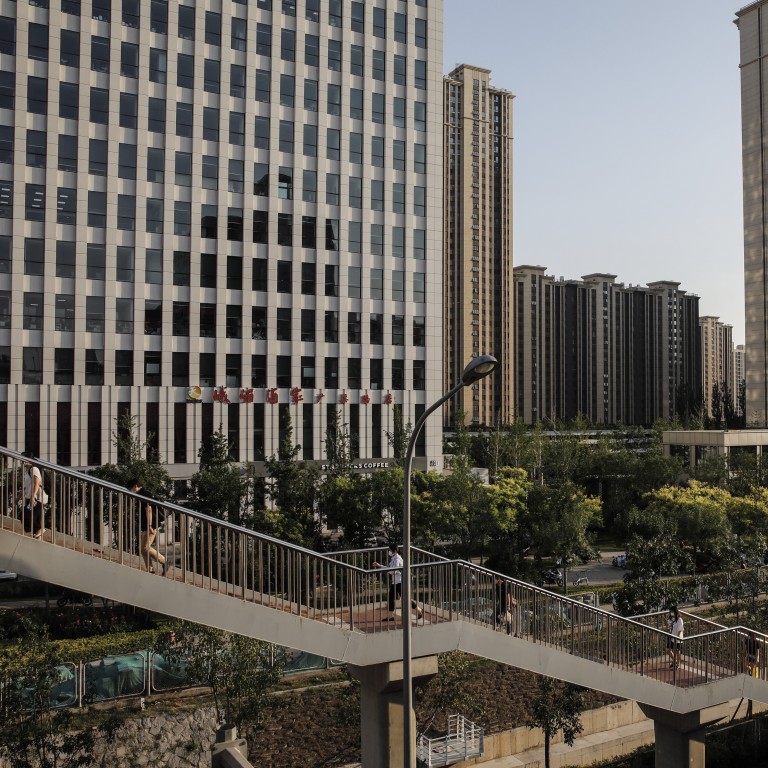
Evergrande puts 223 properties on chopping block as list hits WeChat, online platforms, following back-to-back profit warnings
- Evergrande’s spokesperson says list making its round on online platforms like WeChat is authentic and represents its “normal sales” effort
- More sales of commercial real estate to come this year amid record-high office vacancy rates, with market players more diverged: analysts
“Property companies are trying to sell their products that are not suitable” to their portfolio mix, said Zhang Bo, chief analyst at 58 Anjuke Real Estate Research Institute, a Shanghai-based firm. “At least this year and next year, such reduction of commercial portfolio at a relatively low price will increase.”

02:18
Two Sessions 2020: China sets no GDP target, defence spending growth slows
China’s biggest developers have in recent years offloaded their assets before the economic slump shook the 16 trillion yuan (US$2.3 trillion) market, partly triggered by efforts to cut down borrowings.
Soho China has also been selling down its commercial real estate worth around US$8 billion, while Dalian Wanda sold its hotels and other cultural properties to R&F Properties and Sunac China Holdings. Future Land and Longfor Properties are also said to be dumping some shops, according to analysts.
Evergrande confirmed the authenticity of the “sell list” in a WeChat reply to the Post. The 223 properties are located in 111 cities. The developer has an expansive reach in the onshore market, owning more than 870 projects in more than 280 cities across all provinces and regions.
“It’s a normal sales action,” the company added, without any notion of financial distress. “The company pushed them all out at once because it hopes its professional sales teams can facilitate the deals.”
Office vacancy rates in China’s commercial hubs surge to highest level on record as rents drop amid pandemic headwinds
Shenzhen-based Evergrande’s borrowings grew 19 per cent to 800 billion yuan as of December 31, of which about 47 per cent of them were to be repaid in 2020 and about a quarter by the end of 2021. Its cash stood at 229 billion yuan, according to its latest 2019 annual report.
“In bad times like now, when developers need money urgently and they do not have enough lands or homes to sell, they have to get rid of underperforming commercial assets,” said Ray Wu, Head of Investment at Savills’ Investment Shenzhen.
The block-list of properties suggests a strategic change in business, property analysts said. It came as oversupplies have dragged down the value of commercial assets amid record vacancy rates.
‘Opportunity of a lifetime’ for distress investors as companies from HNA to China’s LVMH flounder and bad debts balloon
Evergrande, for example, this year adopted a new development strategy of “growing sales, controlled scale and reduced leverage,” according to its annual report. Since 2017, it has also switched its model from “three highs and one low”, referring to high liabilities, leverage and turnover, and low costs.
Chairman Hui has been a professor in management in Wuhan University of Science and Technology since 2003 and was appointed as doctoral tutor there in 2010, according to its annual report.
Chinese developers are so used to getting high profit quickly through purchasing land and selling homes within one to two years, or sometimes even as short as a couple months. But it has been hard for them to manage commercial assets.
“Like Evergrande, for example, its commercial units are under each regional division and when it comes to evaluation of their work performance, sales is the most important benchmark,” said Wu of Savills. “How do you expect their people to put more effort into leasing an office unit or a shop?”
Looking ahead, analysts expect more commercial property projects to be placed onto the market later this year. This trend is also likely to extend into 2021, they added.
“The strong ones will become stronger,” said Zhang of Anjuke. “Although these assets in good locations of cities with good development potential will face some headwinds in the short-run, they can be relatively valuable in the long run.”


